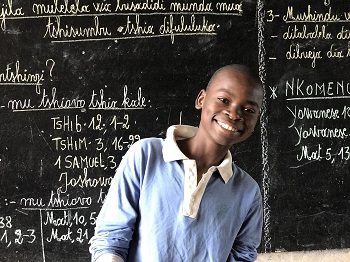DR Congo: Children’s access to education under threat from ongoing violence in Kasai region
As school year begins, UNICEF and partners launch campaign to help 150,000 children return to school
A large campaign to get 150,000 primary school-aged children back to the classroom has kicked off in the volatile Kasai region of the Democratic Republic of the Congo (DRC) following months of clashes between militias and security forces that have displaced thousands of families and left 850,000 children without access to essential services like education and healthcare.

After a year of disruption and uncertainty, children are returning to school in the Kasai. The classroom is an important place for healing as children are able to focus on the future and think about their studies, their friends and their games.
UNICEF estimates that in the five provinces hit hardest by the crisis – Kasai, Kasai Central, Kasai Oriental, Sankuru and Lomami – 440,000 children were prevented from finishing the previous school year because of insecurity. Since the start of the crisis, more than 400 schools have been attacked, and the fear of violence means that parents are reluctant to send their children to school.
“It is crucial for children to return to school to restore a sense of normalcy in their lives after months of fear and uncertainty,” said Dr Tajudeen Oyewale, Acting Representative of UNICEF in the Democratic Republic of Congo.
The back-to-school campaign carried out by UNICEF and it partners across the Kasai region includes communication activities encouraging parents to enroll their children, distribution of school material for the most vulnerable children and training for 2,750 teachers in peace-education and psychosocial support.
In order to create a safe return to school, UNICEF supported the training of teachers and conducted awareness raising of communities on risks related to mines and war remnants in the school environment.
The violence that started a year ago has expanded throughout the Kasai region and even beyond, forcing thousands of children and their families to flee into the bush to escape the fighting.
“Children who have returned home after hiding for months all speak of their eagerness to be back in school,” said Oyewale. “The same goes for all the children who have been compelled to take part in the hostilities in one way or another. They are looking to the future, and they know education is a way forward.”
Source:United Nations Children's Fund
- 299 reads
Human Rights
Fostering a More Humane World: The 28th Eurasian Economic Summi

Conscience, Hope, and Action: Keys to Global Peace and Sustainability

Ringing FOWPAL’s Peace Bell for the World:Nobel Peace Prize Laureates’ Visions and Actions

Protecting the World’s Cultural Diversity for a Sustainable Future

Puppet Show I International Friendship Day 2020

